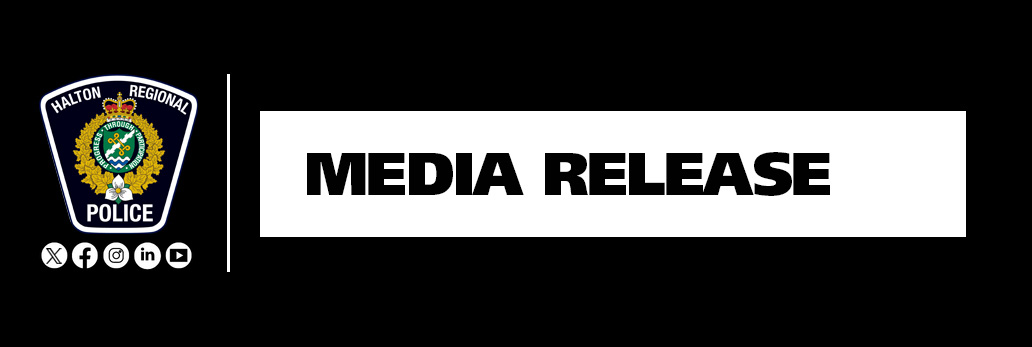
OAKVILLE, ON (August 27, 2025) – Since 2001, individuals and organizations from Halton region and beyond have recognized August 31 as International Overdose Awareness Day. The aim of the annual occasion has been – and continues to be – to honour the lives of those lost to drug toxicity and to remind their loved ones that they are not alone in their grief.
This morning, members of the Halton Regional Police Service (HRPS), in partnership with Halton Region Public Health and the Halton Opioid Action Table (HOAT), gathered at its Headquarters in Oakville to raise a flag to mark the upcoming day, to hear first-hand from individuals with lived experience, and to share how the community can continue to assist those in need. They were joined by the representatives from the Halton Police Board, Halton Region Paramedic Services, local councillors, and a number of agencies who provide specialized support in this area.
In addition to the flag raised today, purple lights will shine at all police locations tonight through August 31 in honour of those who have passed away, the grief held by those left behind, and efforts to raise awareness and address the ongoing opioid crisis.
“The safety and well-being of our community remain our Service’s number one priority,” said Chief Stephen Tanner, Halton Regional Police Service. “We are proud to stand with families and the many who work so tirelessly in this space to remember those lost to overdose and to remind everyone that there is hope for a brighter future. Resources are available 24/7/365 through our Service, Halton Region Public Health, and our valued community partners. We urge those who need help to reach out to us. You are never alone.”
“International Overdose Awareness Day is a reminder that behind every statistic is a person, a life lost, a family grieving, and a community affected,” said Associate Medical Officer of Health, Dr. Patrick Galange, Halton Region Public Health. “We are committed to working with our partners to prevent these tragedies through harm reduction, education, and compassionate care. Together, we can reduce stigma, expand access to lifesaving tools, and ensure that no one in Halton faces this crisis alone.”
2025 at a Glance:
Between January 1 and July 31, frontline HRPS officers responded to 70 known or suspected opioid-related drug poisonings, a 72% decrease from the same period last year. Four of these overdoses were fatal and, in each case, the victim was alone. While the reduced need for emergency response is a step in the right direction, illicit and prescription drugs – including opioids, still have a profound and, at times, tragic, impact on the health and well-being of individuals of all ages and backgrounds in Halton region and nationwide.
To help counter this, the HRPS, Halton Region Public Health, and others continue to provide lifesaving naloxone kits to anyone who is interested. They are available free of charge and no questions asked at Halton Region Harm Reduction Services (Exchange Works), Halton Region Sexual Health clinics, HRPS Central Lock-Up, through Mobile Crisis Rapid Response Team and Community Mobilization police officers, and most pharmacies.
Additional Information and Resources:
A wealth of valuable information and resources can be found on the HRPS website, here, or through Halton Region Public Health, here, including:
Safer use: Never use alone or at the same time as another person. Always carry naloxone, which can temporarily reverse an opioid overdose until the individual can be transported to hospital for treatment.
As the quality of street drugs is unpredictable and any drug can be cut with (or contaminated by) other agents or drugs that can be fatal in minute amounts, go slow. Know your tolerance and always use a small sample of a drug first to check its strength.
Due to the possibility of opioid contamination or poisoning, naloxone should be used in all suspected drug poisonings.
Know the signs: Difficulty walking, talking, or staying awake, blue lips or nails, very small pupils, cold and clammy skin, dizziness and confusion, extreme drowsiness, choking, gurgling, or snoring sounds, and/or slow, weak, or no breathing are all indicators of an overdose.
How to respond: An overdose is a medical emergency. Administer naloxone if you have it and call 9-1-1 right away. Frontline officers and other first responders in Halton region carry and are trained to administer this vital first aid tool and have done so seven times this year to date.
The Good Samaritan Drug Overdose Act provides legal protections to anyone seeking emergency support during an overdose, including the person experiencing the overdose. No one – whether they stay or leave the scene – will be charged with simple possession or breach of conditions regarding simple possession of controlled substances for summoning help.
*Note: Data cited in this release should be considered preliminary and is subject to change.
Media Inquiries:
Halton Regional Police Service
Media Relations
Phone: 905-825-4777 ext. 4899
Email: corpcomm@haltonpolice.ca

 I Want To
I Want To





 Subscribe to this Page
Subscribe to this Page